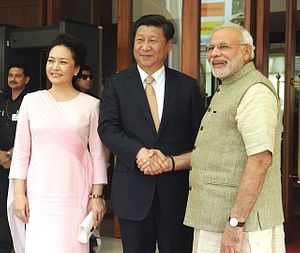For the third time in a year, Indian Prime Minister Narendra Modi will meet President Xi Jinping–this time in China. Modi is visiting China at a time when the latter’s diplomatic and military influence is increasingly being felt throughout the region, commensurate with its growing economic clout.
China’s impressive resurgence as a great power constitutes a deepsea change in the politics of India-China relations. As neighbors, as trading partners, and as regional powers with conflicting geopolitical priorities, the China-India relationship is becoming increasingly complex. Viewed as two rivals competing for regional leadership, the trends seem increasingly to favor China.
Both Modi and Xi have the task of avoiding confrontation, and indeed both leaders seem to be investing their personal reputations in a process of reconciliation. This was evident in Xi’s decision last year to first land in Modi’s hometown of Ahmadabad before heading to New Delhi, and Modi’s decision now to first land in Xi’s home province of Shaanxi before going on to Beijing and Shanghai. These gestures have prompted considerable optimism among observers about the prospects of a dramatic turnaround in the bilateral relationship. But the business of reconciliation is not easy, particularly when misperceptions and mistrust remain unaddressed.
A powerful and assertive China as a neighbour is a factor that no Indian prime minister can ignore. It is a new yardstick by which India should measure its status. India and China are states of mismatched status that express power very differently. Having the world’s largest population, China is an economic behemoth, clearly reflected in its status as the world’s second largest economy holding the world’s largest currency reserves. Moreover, China is also a recognized nuclear power, a permanent member of the UN Security Council, and is far ahead of India in terms of its military capabilities. This formidable scale readily translates into potential international implications, both positive and negative.
Under Xi’s leadership, China is eager to convert its economic power into political influence in terms of greater leverage against other states, having concluded that checkbook diplomacy alone is not sufficient to make the world Sino-centric. With the Asian Infrastructure Investment Bank (AIIB) and New Development Bank, China has taken a decisive lead in radically reshaping the global financial architecture by challenging the current U.S.-dominated version.
The logic of containment cannot be underestimated, given India’s weakening position in its border dispute with China, the anti-India fallout from the Pakistan-China alliance, and China’s increasing attempts to dominate the Indian Ocean region. Yet there are a number of compelling reasons why India should actively engage China. The most important factor is a shared conviction that some institutionalized cooperation, instead of unrestrained rivalry, works to the benefit of both countries. There is also India’s conclusion that the rise of China is unavoidable, and that the best strategy is thus to enmesh China into regional institutions with the intention of precluding the prospect of Chinese domination of the region. As China continues its phenomenal economic development, there is a growing realization in India that China can be used as the “engine” of its own economic growth. Modi represents this belief.
Obama’s America firmly recognizes India as an indispensable partner in the stability of Asia, and Xi’s China is fully aware of India’s tremendous economic potential. But Modi’s India has yet to develop a workable formula to maintain the security relationship with the United States and foster cordial relations with China. There is a constant fear of India being sandwiched between China and the U.S., but this fear is exacerbated by India’s own inability to measure its own power and purpose objectively. How India conceives itself – its power and purpose – holds the key to relations with China, which has already decided to position itself as one pole of the coming bipolar world.
Vinay Kaura is an assistant professor in the department of International Affairs and Security Studies, and Coordinator at the Centre for Peace and Conflict Studies, Sardar Patel University of Police, Security and Criminal Justice, Jodhpur, Rajasthan, India.

































